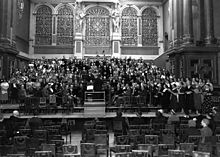Judas Maccabaeus

Judas Maccabaeus ( HWV 63; Ger. Judas Maccabaeus ) is an oratorio in three acts by Georg Friedrich Handel .
Emergence
The political background of Handel's oratorio is the Jacobite Rebellion of 1745. On August 2nd, Charles Edward Stuart landed as a pretender to the English and Scottish throne with an invading army in Scotland and marched on England after several successful smaller battles. To encourage the English, Handel hastily composed the Occasional Oratorio , a pasticcio, in early 1746 . After the rebellious Jacobites were finally defeated in the battle of Culloden by the royal army under Wilhelm August, Duke of Cumberland (a son of George II ), on April 16, 1746, he set about a work to pay homage to the general.
According to the dates in the autograph, Handel composed the first act from July 9 to 21, and the second from July 25 to August 2. He completed the fully orchestrated work on August 11th. According to the memoirs of the librettist Thomas Morell , which he wrote down 25 years later, the plan for the oratorio was drawn up as early as 1745. The Prince of Wales (the brother of the Duke of Cumberland) had recommended Morell as a librettist. In line with the idea of congratulating the Duke of Cumberland on his victorious return from Scotland, the libretto is dedicated to the "Truly Wise, Valiant, and Virtuous Commander".
It premiered on April 1, 1747 at the Theater Royal in Covent Garden . Judas Maccabaeus quickly became Handel's most popular oratorio, which was regularly revived. In the course of time he enriched it with some attractive numbers that he adopted from other oratorios without removing anything from the premiere version. Since one does not want to do without the pieces that have been added in modern performances, the version played at the premiere is rarely heard today.
The aria Oh liberty was in the original libretto, but was instead used by Handel for the Occasional Oratorio . In the Judas Maccabaeus he took it over from the third performance. In 1750 he added the choir See the conq'ring hero comes from Joshua to the oratorio , one of his most popular pieces, which became known in the German-speaking world under the text Daughter Zion, happy you .
Handel composed the duet Sion now her head shall raise with the ensuing choir for a resumption of Esther in 1757 and took it over to Judas the following year . At the same time, he also added the aria Wise men flatt'ring , which he had written for Belshazzar the previous year .
libretto
The libretto was written by Thomas Morell based on the stories in the (apocryphal) First Book of the Maccabees (1 Makk 2-8) about the Jewish freedom fighter Judas Maccabeus. He also used some motifs from the Antiquitates Judaicae by the historian Flavius Josephus .
people
The cast was sung by the following singers at the world premiere:
- Judas: John Beard ( tenor )
- An Israelite: Caterina Galli ( mezzo-soprano )
- An Israelite: Elisabetta de Gambarini ( soprano )
- Simon, brother of Judas: Henry Theodore Reinhold ( bass )
- Eupolemus, Jewish envoy in Rome: Thomas Reinhold
action
first act
The choir of the Israelites mourns the death of Mattatias , the father of Judas Maccabaeus. The high priest Simon proclaims that in a revelation God has appointed Judas Maccabaeus to be the successor who will lead the Israelites to victory. The Israelites take courage, follow him, and pray for their freedom.
Second act
The Israelites have returned victorious from the battle against Samaria and Syria. They exult in their happiness and praise Judas. A messenger comes and announces that a new war is looming on the part of Egypt. The Israelites immediately fell into despair again, but were appeased by Simon that the new plague was not sent to destroy them but to chastise them. Judas again starts the battle cry that the Israelites follow.
Third act
While the Israelites are celebrating the festival of light , a messenger comes from Kapharsalama and reports the battle. Judas moves in as the winner. He exhorts to remember the fallen in the hour of victory. Eupolemus, the Jewish envoy in Rome, reports of an alliance with the Roman Senate that protects the independence of Judea. Songs of praise and thanks conclude the oratorio.
See also
literature
- Hans Joachim Marx : Handel's oratorios, odes and serenatas. Vandenhoeck & Ruprecht 1998, ISBN 3-525-27815-2 .
- Albert Scheibler, Julia Evdokimova: Georg Friedrich Händel. Oratorios guides. Edition Cologne, ISBN 3-928010-04-2 .
- Friedbert Schmidt: Conqu'ring hero's choicest treasure - Georg Friedrich Handel's oratorio “Judas Maccabaeus” and its agitational function for hierarchical England in the 18th century. Dissertation.de, ISBN 978-3-86624-446-7 .
- Dominik Höink, Jürgen Heidrich (Ed.): Violence - Threat - War. Georg Friedrich Handel's “Judas Maccabaeus”. V & R Unipress GmbH, ISBN 978-3-89971-718-1 .
Web links
- Judas Maccabaeus : Sheet Music and Audio Files in the International Music Score Library Project
- Score by Judas Maccabaeus (Handel work edition, edited by Friedrich Chrysander , Leipzig 1865)

